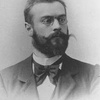
Cornelis Dopper Sheet Music
- Born: 7th February 1870
- Died: 18th September 1939
- Birthplace: Stadskanaal, Netherlands
Cornelis 'Kees' Dopper (7 February 1870,– 19 September 1939, Amsterdam) was a Dutch composer, conductor and teacher. Dopper's reputation as a composer has suffered from the accusation of being 'too German' for much of his career, and still haunts him to this day. Very popular with concert audiences, his works never received much critical acclaim in his home country (unlike abroad). His reputation among the musical avant-garde further suffered because of the so-called 'Vermeulen incident' of November 1918. After a performance of Dopper's Seventh Symphony (which ends with a march) under the baton of the composer, his dissatisfied colleague Matthijs Vermeulenstood up in the hall of the Concertgebouw and shouted: "Leve Sousa" ("Long live Sousa"); the implication being that Dopper was of little more value as a composer than the critically reviled American marchsmith John Philip Sousa (1854–1932). This caused uproar, not just because of Vermeulen's affront, but also because a great part of the audience understood it to be "Long live Troelstra!" (the name of the socialist leader who'd attempted to unleash a revolution days before), and therefore as a call to revolution. In the aftermath, Vermeulen was banned from attending the Concertgebouw for one week, but the subsequent scandal also caused the orchestra board to 'relegate' Dopper. Dopper died in 1939 and was buried at Zorgvlied cemetery. The same piece, the Seventh Symphony, played a more positive role when it was played at the Concertgebouw in November 1940, six months after the German occupation of the Netherlands. The piece contains many songs from Valerius' Nederlandtsche Gedenck-Clanck (Dutch Song of Remembrance), a collection of anti-Spanish songs originating from the Revolt of the Netherlands against the Spanish in the 16th and early 17th century. The finale ends with an 'anti-march', composed by Dopper as a reflection of the First World War, similar to the way in which Ravel's La Valse is a perversion of the sorrowless waltzes of Vienna before that war. The performance, obviously programmed before the German invasion and conducted by Mengelberg, erupted into a patriotic ovation. The recording of that event can be heard today in what is one of two performances of the Seventh Symphony available on record.